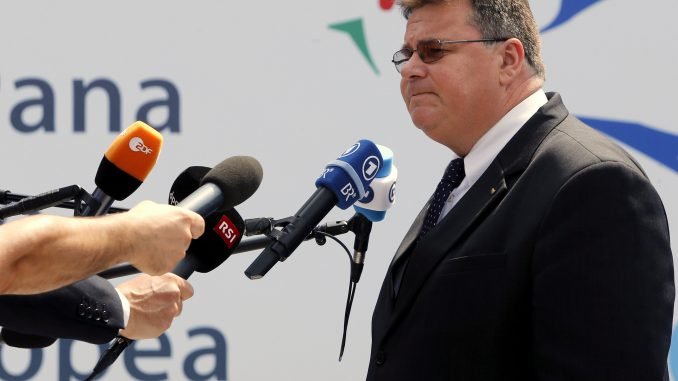
According to Lithuania’s Minister of Foreign Affairs Linas Linkevičius, security situation in Ukraine started to deteriorate significantly after the illegitimate “elections” held by the armed separatists in Luhansk and Donetsk on 2 November.
“By continuously sending military equipment and fighters to Ukraine, Russia is creating a new reality – the new Transnistria – and obviously undermines the Minsk agreement. Therefore, the EU must reinforce its response. We must set clear terms for Russia with regard to the de-escalation of the situation and, in case of non-compliance, impose additional EU sanctions,” said Linkevičius.
According to the minister, the EU must immediately impose an array of new sanctions on separatists, representatives of the Kremlin and their sponsors – political, military and economic elite, propaganda representatives. Moreover, the EU should consistently implement its policy of non-recognition with respect to Crimea, develop a new package of restrictive measures targeting sectoral co-operation and exchanges with Russia, and implement them if the situation on the ground deteriorates.
Linkevičius also stressed that the EU must avoid any steps that could legitimise “people’s republics” in eastern Ukraine.
The European External Action Service was commissioned in addition to draft a list of targeted separatists by the end of the month.
The ministers held a debate on Ukraine, stressing that besides striving to solve the conflict in eastern Ukraine it was very important to implement internal reforms as smoothly and quickly as possible. The EU is committed to support these efforts.
“We have to encourage and help Ukraine implement its internal reforms. Reform of the energy sector, fighting corruption, moving towards decentralisation, implementing the legal reform and measures to improve the business environment should be priority areas. We encourage also other EU member states to follow the example of the Seimas (Parliament) of Lithuania and to adopt the long-term strategy to support Ukraine,” said Lithuania’s foreign minister.
The Council also discussed the Middle East peace process, the situation in the Gaza Strip, Bosnia and Herzegovina, Libya and the fight against the Ebola virus.

Be the first to comment